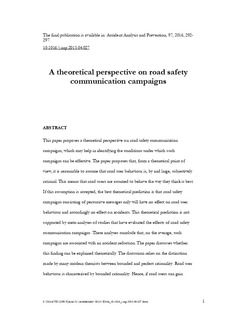| dc.contributor.author | Elvik, Rune | |
| dc.coverage.spatial | Norway | nb_NO |
| dc.date.accessioned | 2019-06-27T08:35:36Z | |
| dc.date.available | 2019-06-27T08:35:36Z | |
| dc.date.created | 2017-01-15T15:22:52Z | |
| dc.date.issued | 2015-05-16 | |
| dc.identifier.citation | Accident Analysis and Prevention. 2016, 97 292-297. | nb_NO |
| dc.identifier.issn | 0001-4575 | |
| dc.identifier.uri | http://hdl.handle.net/11250/2602480 | |
| dc.description.abstract | This paper proposes a theoretical perspective on road safety communication campaigns, which may help in identifying the conditions under which such campaigns can be effective. The paper proposes that, from a theoretical point of view, it is reasonable to assume that road user behaviour is, by and large, subjectively rational. This means that road users are assumed to behave the way they think is best. If this assumption is accepted, the best theoretical prediction is that road safety campaigns consisting of persuasive messages only will have no effect on road user behaviour and accordingly no effect on accidents. This theoretical prediction is not supported by meta-analyses of studies that have evaluated the effects of road safety communication campaigns. These analyses conclude that, on the average, such campaigns are associated with an accident reduction. The paper discusses whether this finding can be explained theoretically. The discussion relies on the distinction made by many modern theorists between bounded and perfect rationality. Road user behaviour is characterised by bounded rationality. Hence, if road users can gain insight into the bounds of their rationality, so that they see advantages to themselves of changing behaviour, they are likely to do so. It is, however, largely unknown whether such a mechanism explains why some road safety communication campaigns have been found to be more effective than others. | nb_NO |
| dc.language.iso | eng | nb_NO |
| dc.publisher | Elsevier | nb_NO |
| dc.rights | Attribution-NonCommercial-NoDerivatives 4.0 Internasjonal | * |
| dc.rights.uri | http://creativecommons.org/licenses/by-nc-nd/4.0/deed.no | * |
| dc.title | A theoretical perspective on road safety communication campaigns | nb_NO |
| dc.title.alternative | A theoretical perspective on road safety communication campaigns | nb_NO |
| dc.type | Journal article | nb_NO |
| dc.type | Peer reviewed | nb_NO |
| dc.rights.holder | © 2015 Elsevier Ltd. All rights reserved. | nb_NO |
| dc.description.version | submittedVersion | nb_NO |
| cristin.unitcode | 7482,2,1,0 | |
| cristin.unitname | Sikkerhet og tiltak | |
| cristin.ispublished | true | |
| cristin.fulltext | preprint | |
| cristin.qualitycode | 1 | |
| dc.identifier.doi | 10.1016/j.aap.2015.04.027 | |
| dc.identifier.cristin | 1427481 | |
| dc.source.journal | Accident Analysis and Prevention | nb_NO |
| dc.source.volume | 97 | nb_NO |
| dc.source.issue | December 2016 | nb_NO |
| dc.source.pagenumber | 292-297 | nb_NO |
| dc.relation.project | Norges forskningsråd: 208437 | nb_NO |

